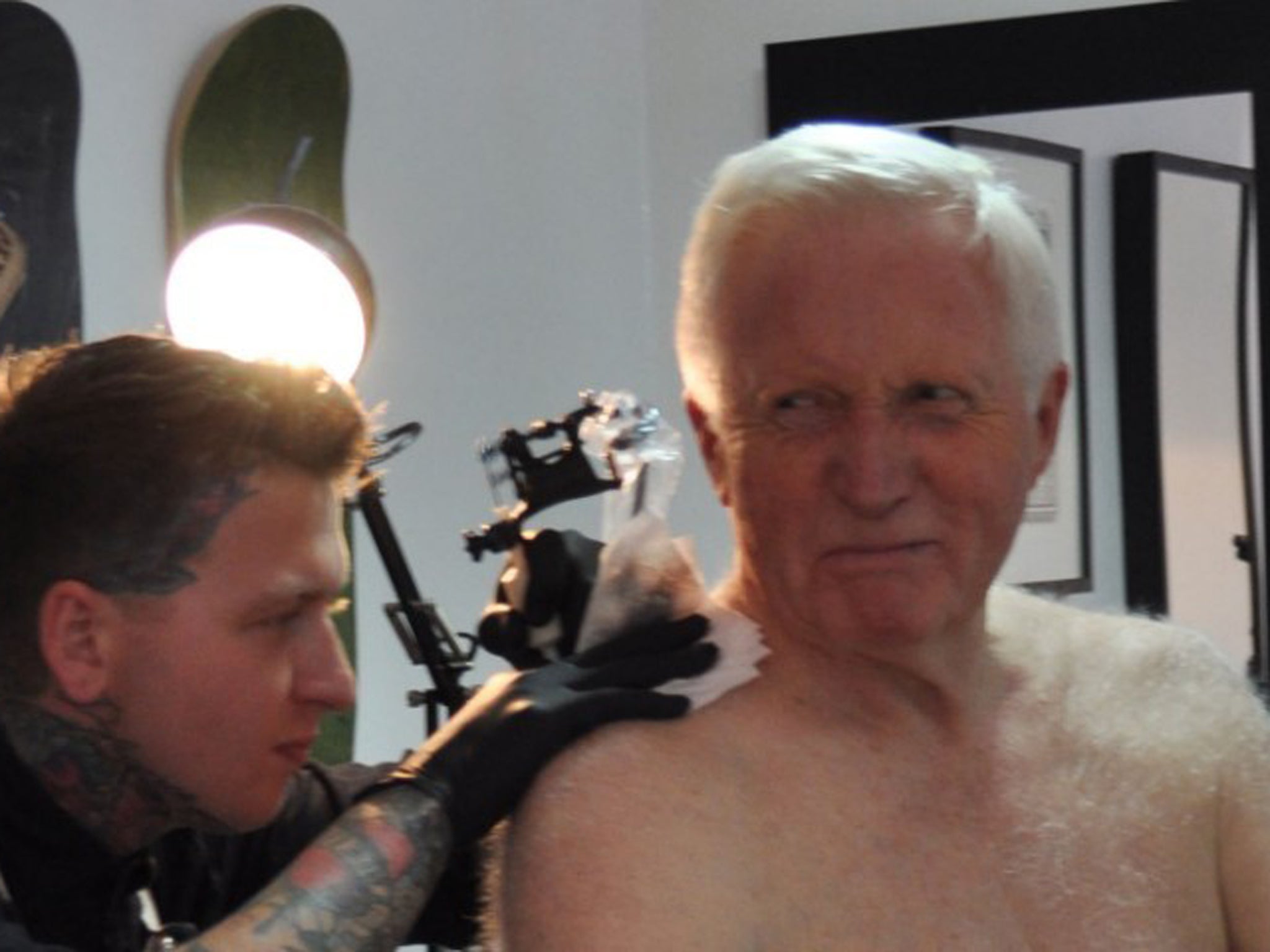David Dimbleby gets inked: so what exactly does a tattoo even mean anymore?
There are many parallels of tattoo significance: Sexy/chavvy, body art/body graffiti, rebellious/criminal

Your support helps us to tell the story
From reproductive rights to climate change to Big Tech, The Independent is on the ground when the story is developing. Whether it's investigating the financials of Elon Musk's pro-Trump PAC or producing our latest documentary, 'The A Word', which shines a light on the American women fighting for reproductive rights, we know how important it is to parse out the facts from the messaging.
At such a critical moment in US history, we need reporters on the ground. Your donation allows us to keep sending journalists to speak to both sides of the story.
The Independent is trusted by Americans across the entire political spectrum. And unlike many other quality news outlets, we choose not to lock Americans out of our reporting and analysis with paywalls. We believe quality journalism should be available to everyone, paid for by those who can afford it.
Your support makes all the difference.Imagine it, the 75 year old, doyen of British political commentary, trundling down Hackney Road, newspaper under arm, walking into uber-hipster Vagabond Tattoo Studio for a “clean, slick and solid” tattoo of a scorpion. Thames Water must be spiking the water because BBC Question Time’s David Dimbleby has just upped his ranking to tattooed celebrity.
Judging from Vagabond’s Instagram account (yes, they are so trendy, they also have a Tumblr), Dimbleby seemed quite jolly on his visit as he cuddled up to staff for a photo-op.
This merging of Hoxton Hipster and Westminster Wrangler shattered the rebellion of ink before my eyes. Ok, so David, an ex-member of the notorious Bullingdon Club but it makes me think, what the hell do tattoos mean anymore?
With all the carnivalisation of inked celebrities that the press relishes in, there’s something surreal about the Dimbleby’s coverage. It’s not shocking. It’s not a sartorial midlife crisis a la Clarkson’s double-denim. It’s not as though he had a dodgy rebellious past; ok, a third class PPE Oxford degree, but that hardly makes him a iconoclast.
It’s just out of the blue and so incredibly dull. Dimbleby is probably the most conventional men in the UK public eye to get tattooed. Ticking the boxes of white, male, middle-class, Oxford, BBC, politics, media dynasty, simultaneously.
The real news behind this barrel scrapping reportage is how his social class and status overrides something that has been creating tattoo backlash for so long. Culturally, we are at constant loggerheads on what a tattoo signifies. Sexy/chavvy, body art/body graffiti, rebellious/criminal - the parallels run on. What the British Sociological Association study would call “abhorrent”, “unsavoury and untidy”, the alternative culture magazine, Bizarre, might call exciting, provocative and bold.
Alongside celebrities, tattooed civilians have been portrayed as lower class, unintelligent and unemployed in the past. The Channel Four documentary series My Tattoo Addiction is full of faceless nobodies who get regrettable tattoos. In the most recent episode, a 30-something man (now back living with his mum and dad) is covering the tattoo on his arm of his now ex girlfriend and mother to his two sons. All we get is a Twilight obsessive and two 30-something men who live with their mums. Where were the lawyers, the bankers, the teachers and their tattoo related sob stories?
Paradoxically, tattoos are sociologically useful as a benchmark to the changing cultures and lifestyles of the modern day. As the current generation are looking for new ways in which to express and individualise themselves, tattoos can serve as rites of passage.
The only significance about Dimbleby’s highly-publicised tattoo against Cheryl Cole, Beckham, and Cara Delevingne, is that he’s not a gossip page regular, he’s the face of British political commentary; the mediator of the lion’s den that is Question Time.
There was nothing rebellious. He was too much of a smart arse about it. Here’s how:
Dimbleby a) got tattooed in a discreet place b) waited until he was old, rich and respected enough so it he’s not going to waiting at the dole queue or banished to Carnyville c) talked up the tattoo as a manly and cultural thing to do after claiming he was inspired to get inked after seeing footage of his documentary on how tattoos came to the country by way of Captain Cook’s South Seas adventures. d) was inspired by his birth sign, Scorpio. Surprisingly, Dimbleby didn’t realise the semantic meaning of the scorpion as on of the HIV warning tattoos for gay men.
So is this going to deter all those unplanned, regrettable tattoos done by overzealous teenagers? Probably not. Are tattoos now uncool? No. The whole rebellion of tattoos is that you get them at 18, on your face and preferably with the name of a one night stand.
Every time we see Dimbleby on television, we should all remember that he once got tattooed by Steve from Hackney.
He couldn’t have thought too long about his tattoo, however, after it has been reported that his scorpion has six legs instead of the arachnid eight. There you go kids, look who’s dim now.
Join our commenting forum
Join thought-provoking conversations, follow other Independent readers and see their replies
Comments